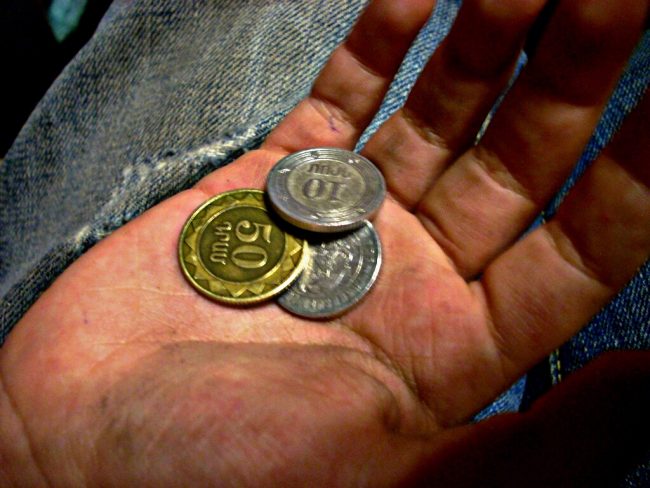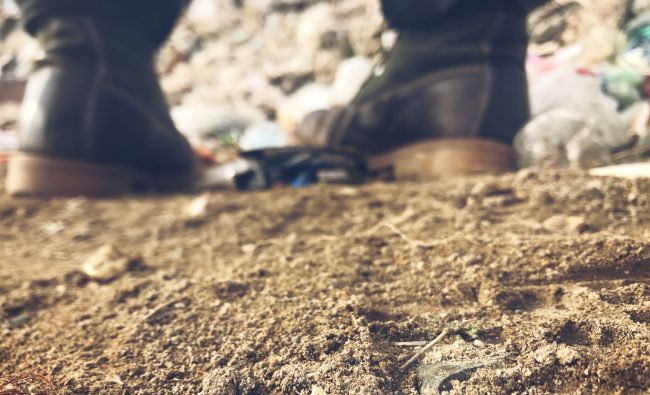

 In the streets of Yerevan, children begging for money is not an uncommon sight. While parents can face time in prison for child neglect, many join their children in the streets, finding an income any way they can.
In the streets of Yerevan, children begging for money is not an uncommon sight. While parents can face time in prison for child neglect, many join their children in the streets, finding an income any way they can.
‘I will grow up and find a normal job’
Early every morning, 13-year-old native of Gyumri, Karen (not his real name), walks out of his house towards the city dump. Even though he goes with his mother, his face is too serious and too mature for his age. He does not attend school.
‘It’s been two years since I started working with my mother’, he says. ‘We go to the dump. Each of us has our own work area there. We join our group and start digging through the rubbish. We separate glass containers, find useful clothes, and some furniture. Sometimes we find tinned food’, Karen says.
Karen has engaged in physical labour and begged for money from an early age. He says he was only six years old when he started helping his parents, by tearing labels off collected bottles. When he was a bit older, he went out to the street to offer his services wiping the windows of parked cars.
‘I asked ֏50 ($0.10) for cleaning windows. There were drivers who used my services. There were men who paid ֏50, which was as much as I wanted. And there were others who paid more. There were also many bad people who made me work and didn’t give me my money. They even cursed at me if I demanded to be paid for my work’, Karen remembers.
Talking about his time begging for money is difficult for Karen. Initially, he says he was ashamed, but then came up with a way to get around that feeling.
‘I have a large shirt with a hat attached to it. I wear it when I go out collecting money so that I can cover my face. This a temporary job, nobody should see what I’m doing now. I will grow up and find a normal job. Right now we don’t have enough money, so on weekdays I go to the dump and on the weekends I beg’, he says.
Karen mostly begs around churches. There is usually a wedding at at least on church per week, which he says earns him the most money.
‘I’m not the only one. There are some other boys with me, and also adults. You have to be resourceful in this case, because the first one to approach a person giving money keeps it. Sometimes, not everybody gets money, so someone might try to take it from the rest of us, by either persuasion or using force’, the boy says.

An underestimated problem?
Official statistics appear to underestimate the number of children working as beggars. According to the National Statistical Service, there were just 13 beggar and vagrant children registered in 2016. Seven of them were in Yerevan and the rest from the regions.
The police are the main state agency working with vagrant and beggar children.
‘It’s very important that there an environment that is attentive to the needs of children. We must realise that we share responsibility for every child. For example, no children working as beggars were found in Vayots Dzor Province [in southeast Armenia]. There are rarely beggars to be found in the provinces of Lori and Shirak [in northern Armenia]’, Colonel Nelli Duryan, told OC Media.
Duryan is the head of the Department for the Prevention of Juvenile Delinquency and Domestic Violations at the General Department of Criminal Intelligence. She says her department consults with parents of children who beg, and provide psychological support. If the problem is not resolved, the parents can be found criminally liable.
In 2015, a woman in Vanadzor was found guilty of having her 8-year-old son beg. She was sentenced to a year in prison, and her son was taken into care.
‘Many success stories’
The Orran Day Care Centre helps children living on the streets and those without proper parental care, working with both the state and other NGOs. The charity was founded in 2000, helping 16 children in its first year. Since then, the organisation has helped hundreds of children. They now have centres in Yerevan and Vanadzor, with 105 children housed in the former and 118 in the latter.
‘We give them hot food, we deal with their health issues and psychological problems, we do homework together, teach handicrafts’, Susanna Manukyan, the Public Relations Manager of Orran tells OC Media.
The children are also provided with money for transport and participate in clubs, she says. They host courses on carving and pottery, which teach the children a craft and help them to earn their living.
She adds that they are trying to give these children proper attention and care, even without offering financial assistance. According to Susanna Manukyan, they have helped many children: and about 500 have learned a trade and obtained stable jobs.
‘Of course, we can’t publicise personal information, but we help to ensure that many children live a prosperous life; one has his workshop already, another works in a factory, there are many success stories’, says Manukyan.
‘Begging is also work’
11-year-old Narek (not his real name) can often be found in the centre of Yerevan. He walks the streets as if he was selling things, but in reality he begs for money. Missing even a day of begging will result in the whole family going hungry.
‘I have pocket napkins with me and my hand-made drawings. I offer them to the passers-by. Both my mother and brother beg for money. We don’t walk together; we always walk apart, but not far from each other. My mother always keeps her eye on me’, Narek says. During his interview with OC Media, she always kept an eye on him.
They have worked out signals in case someone is trying to hurt or kidnap him. If police or other officials come to detain him, his mother approaches them and tells them they are together.
Narek manages to collect about ֏2,000 ($4) per day, which they use to buy bread and some other food. The money his mother and brother earn is used to pay rent and for utilities.
‘There have been times when people came and offered to take me to a special care centre. They said the place was warm and had tasty food. But I didn’t go. Why should I? To sit idly and wait for a piece of bread? I earn money for my bread thank you’, says Narek. Не says that begging is also a job.









